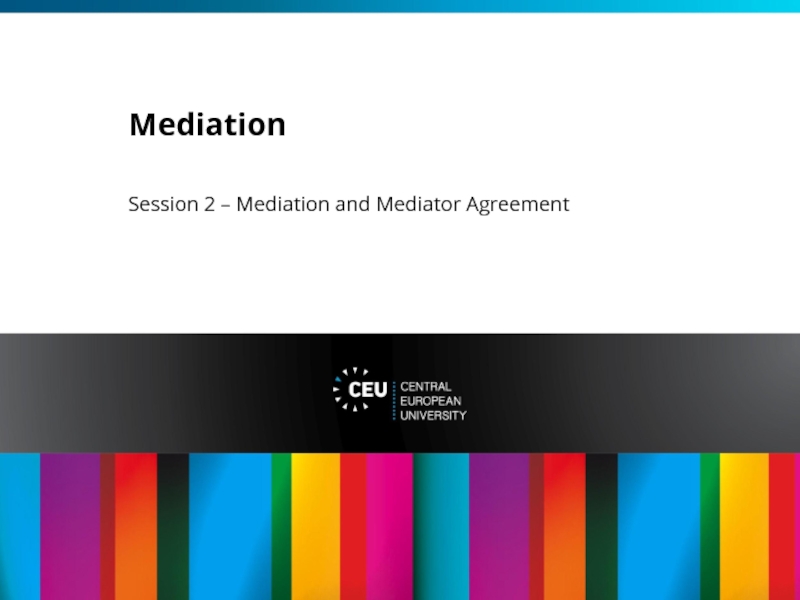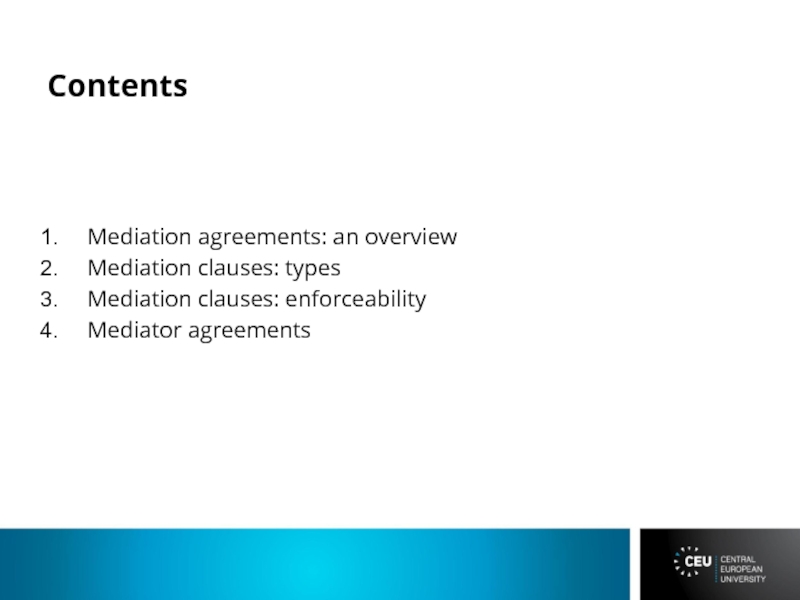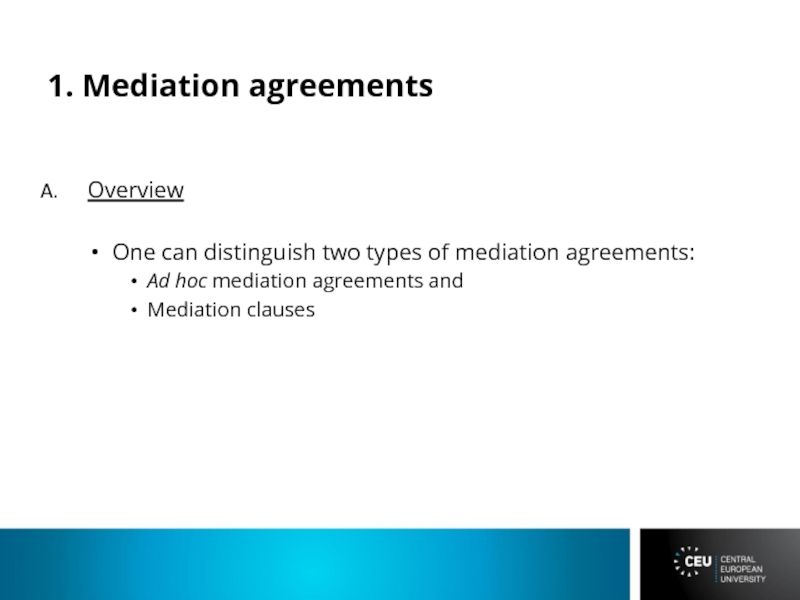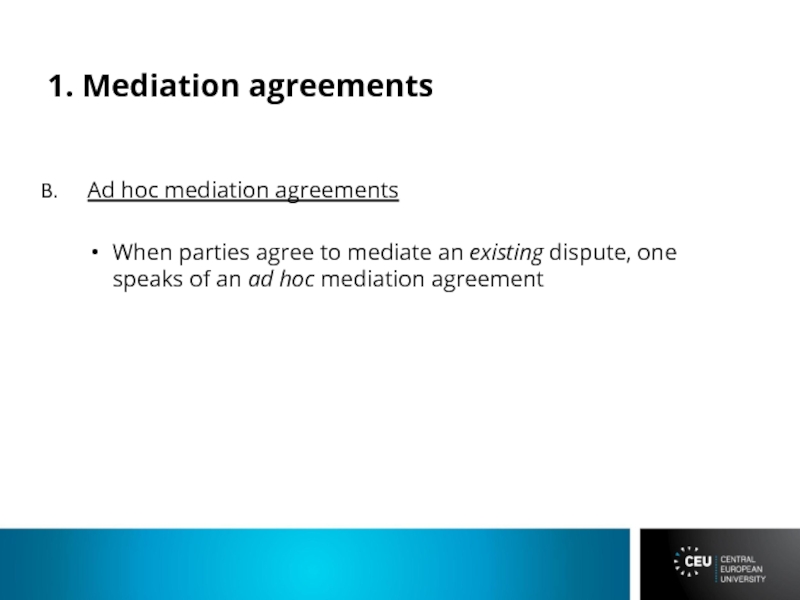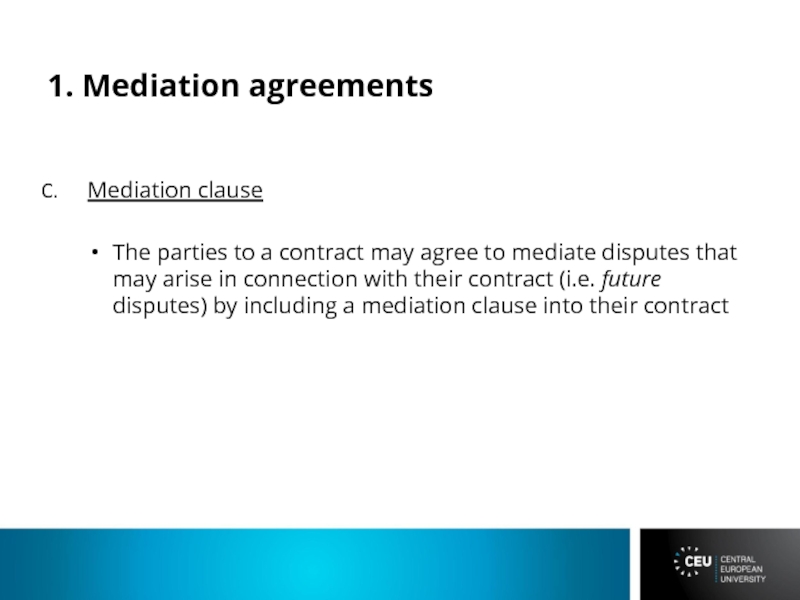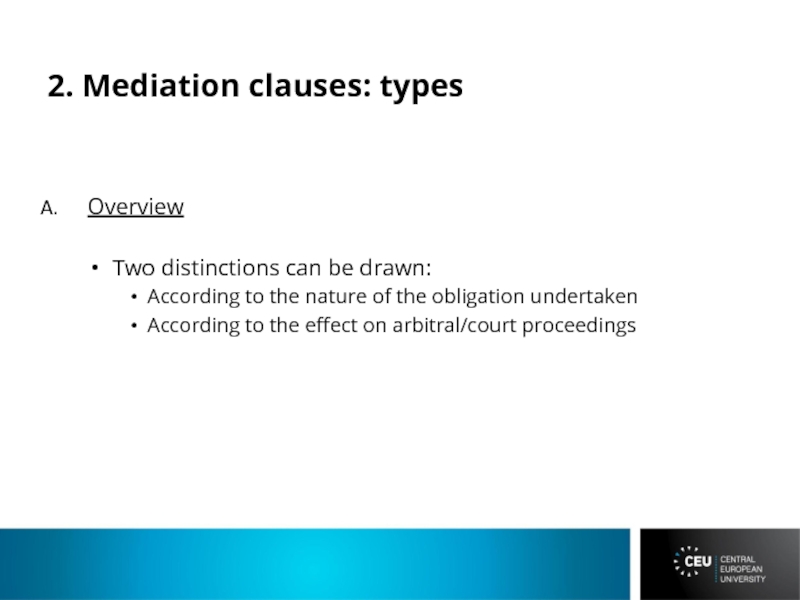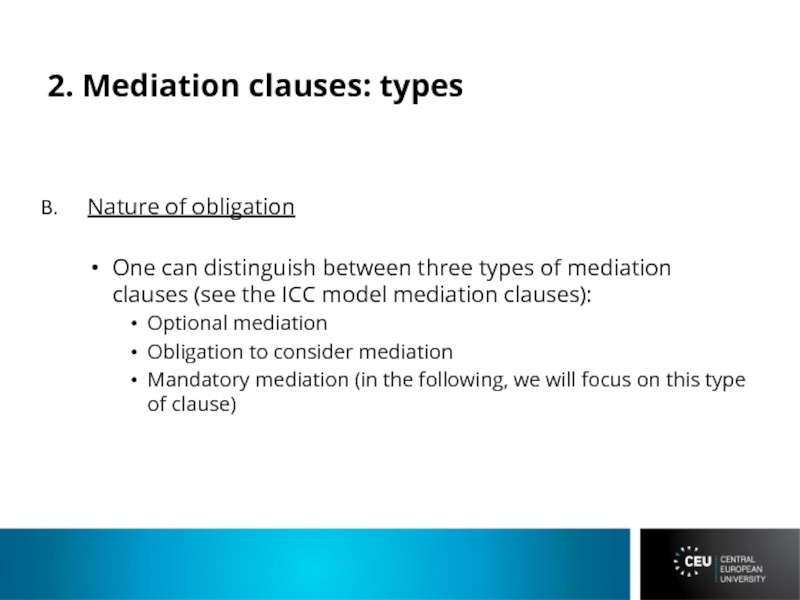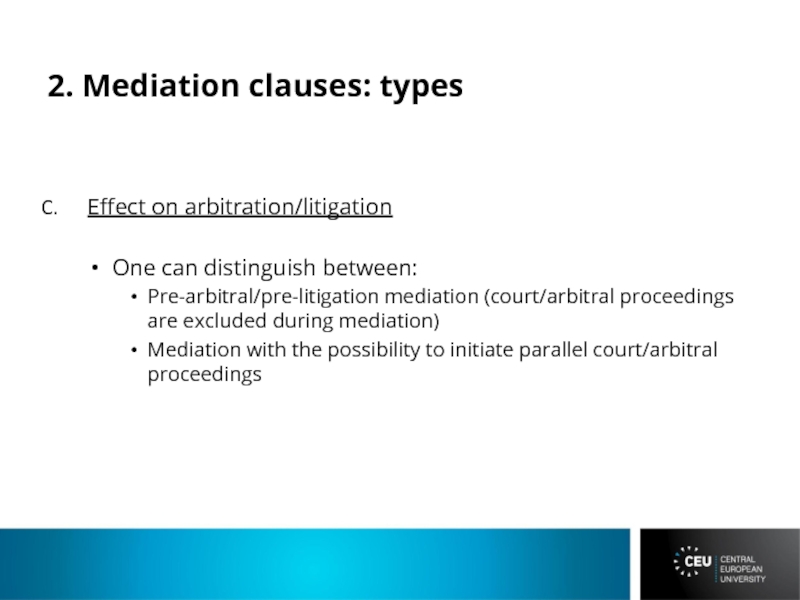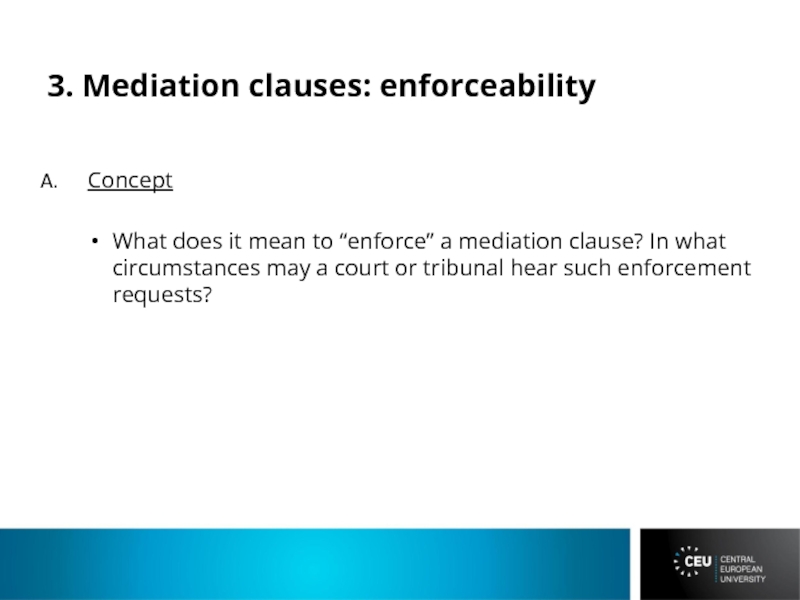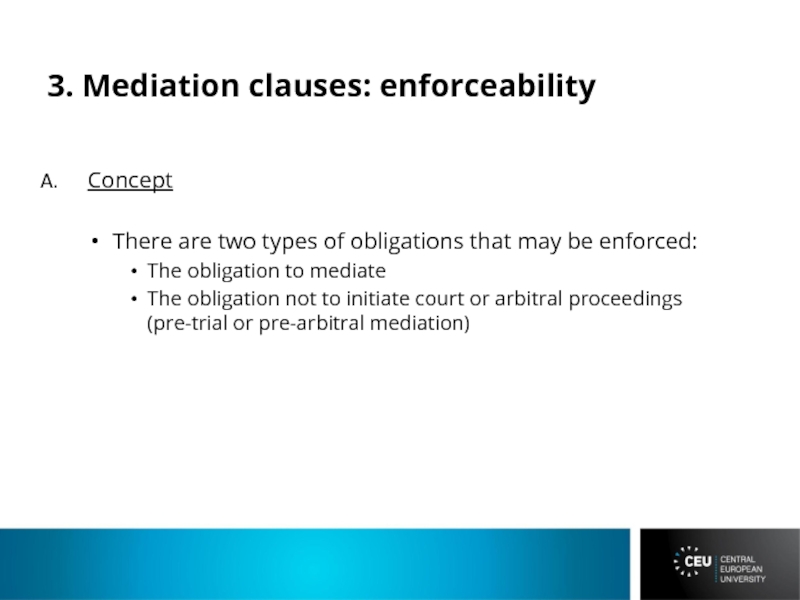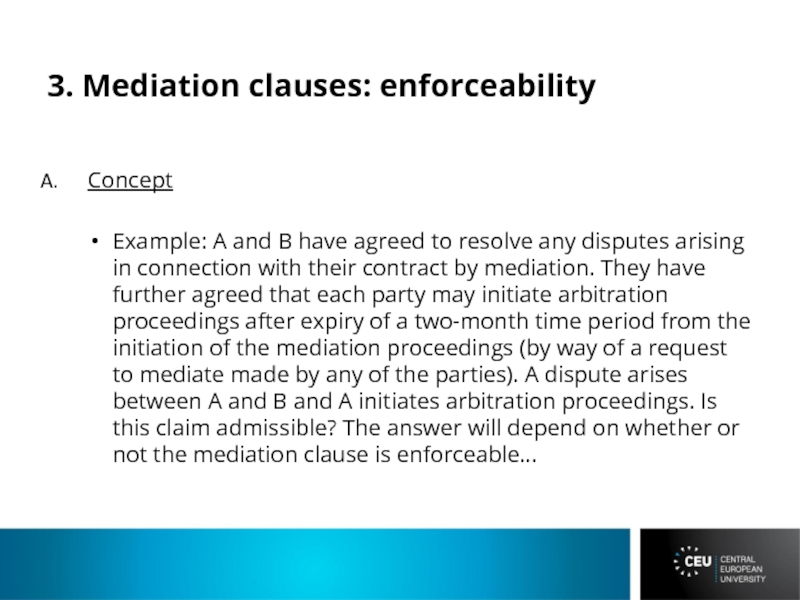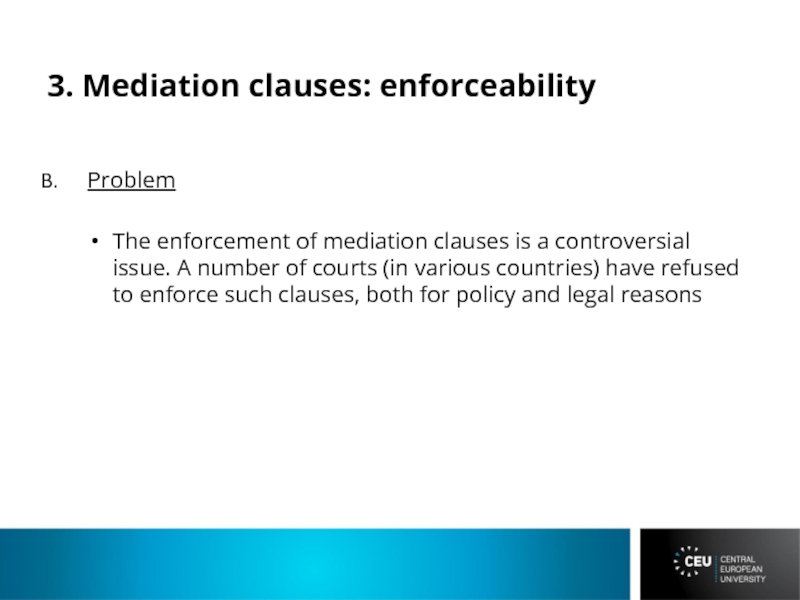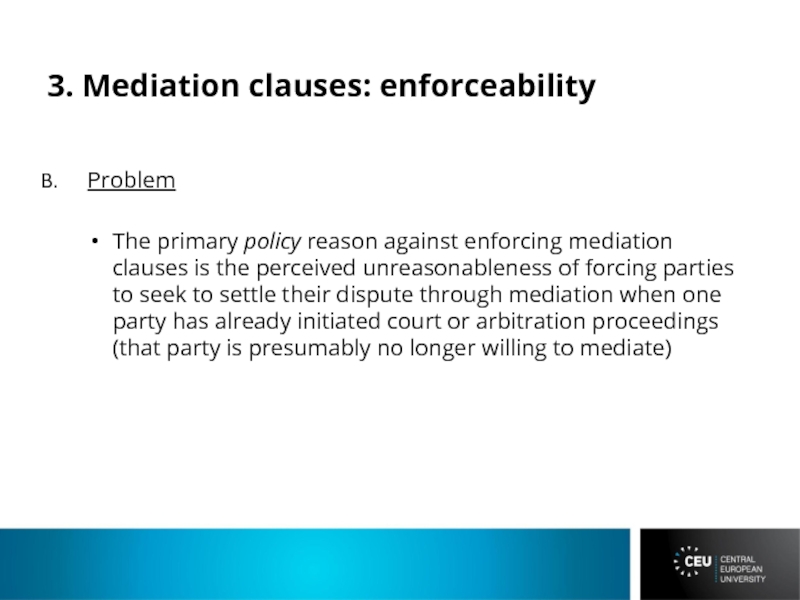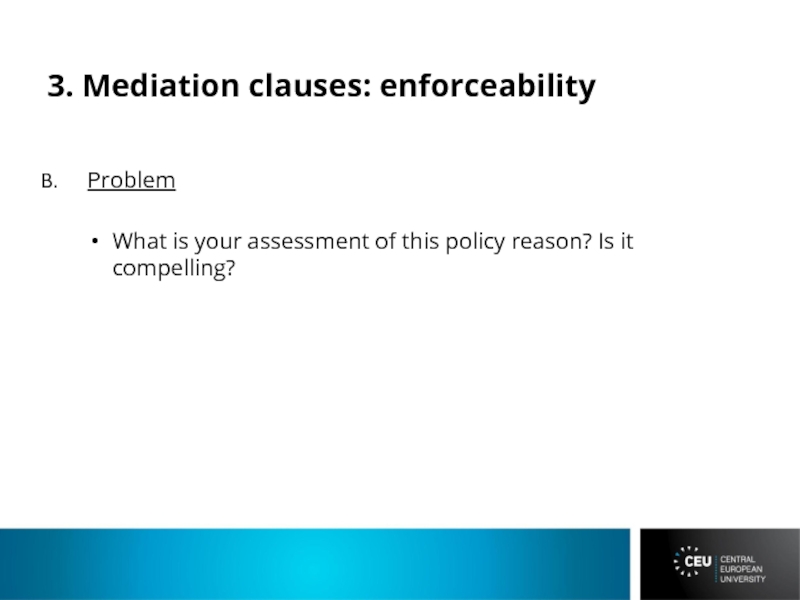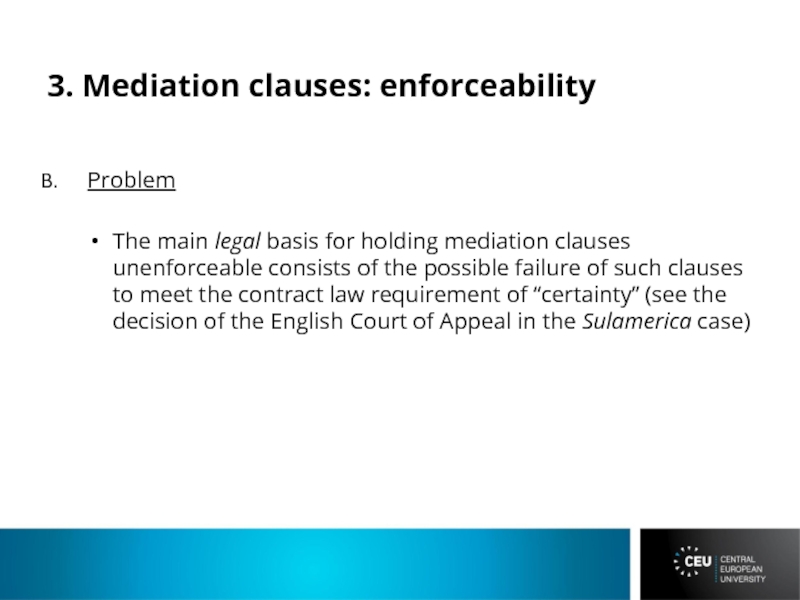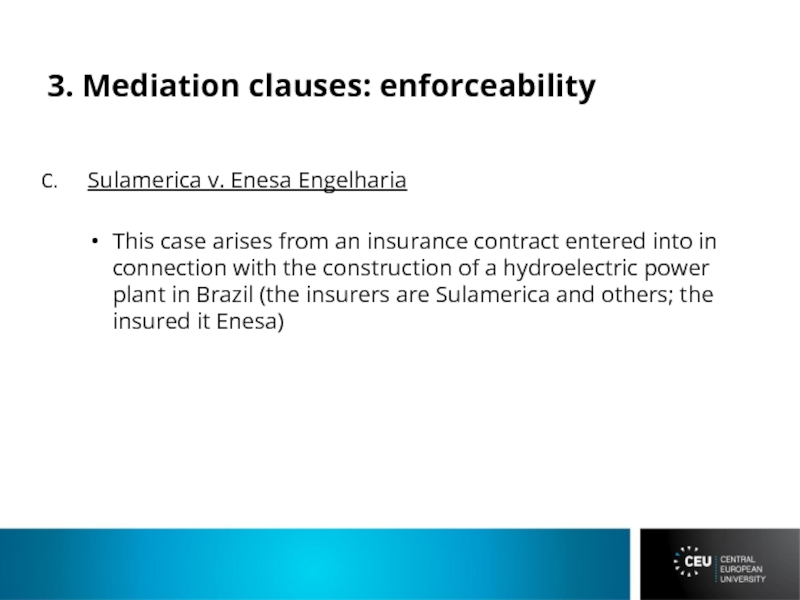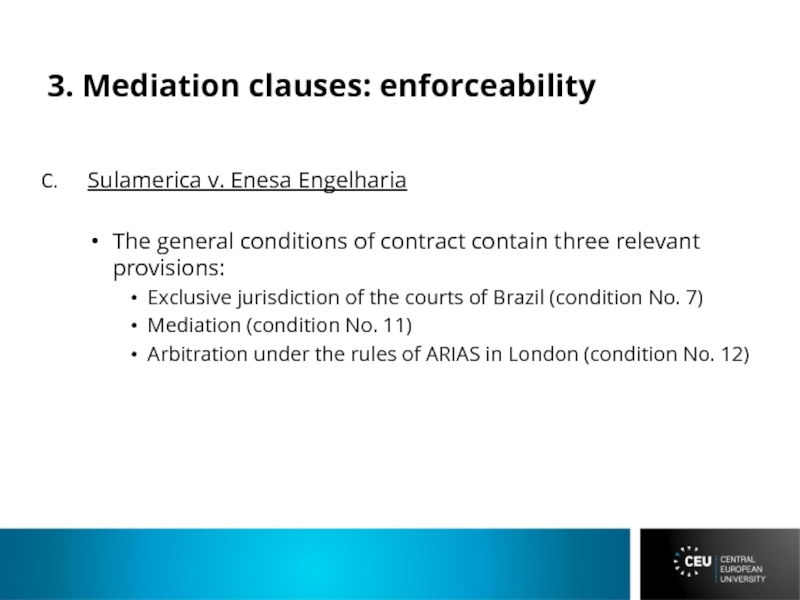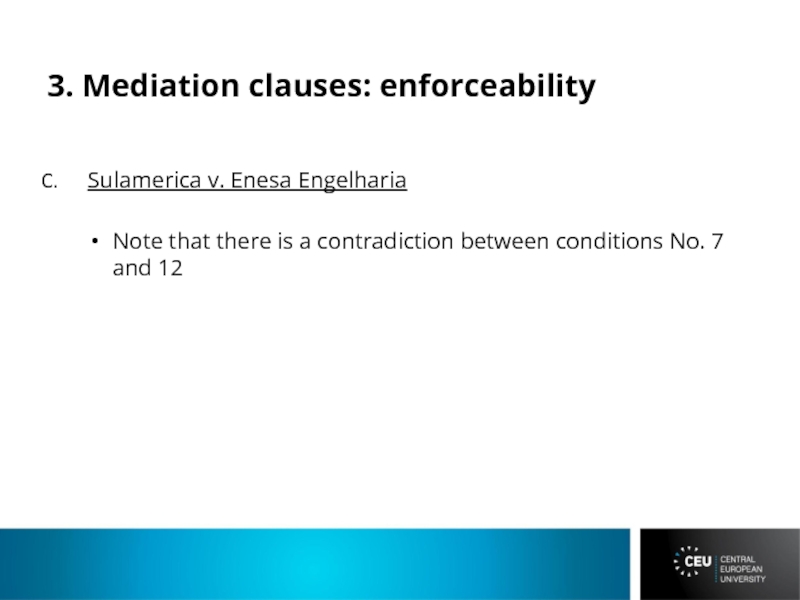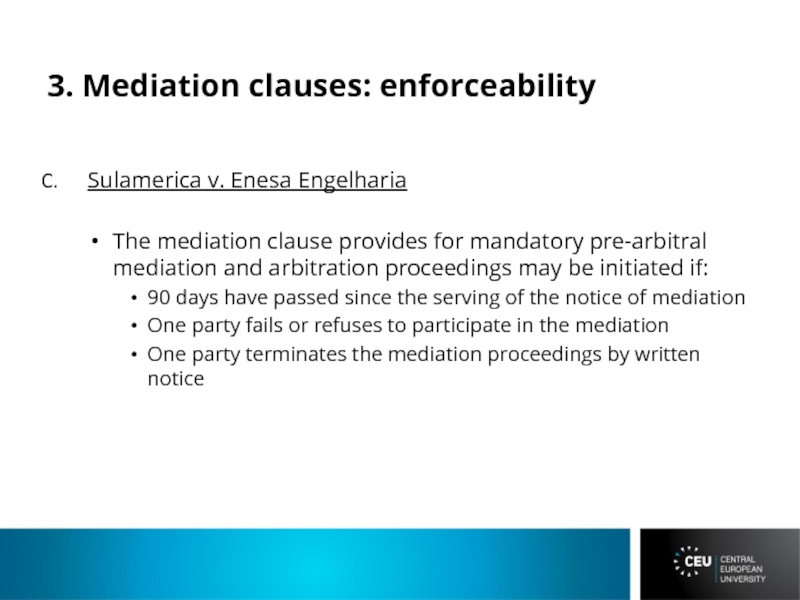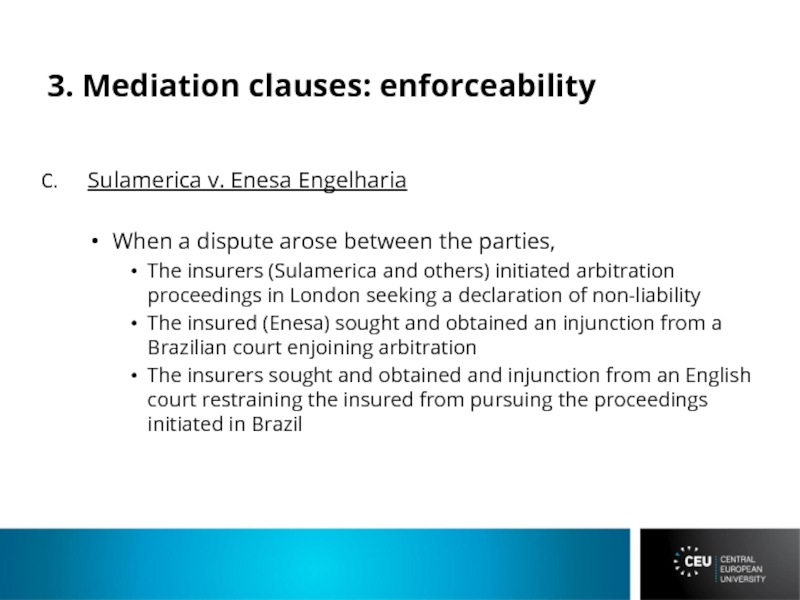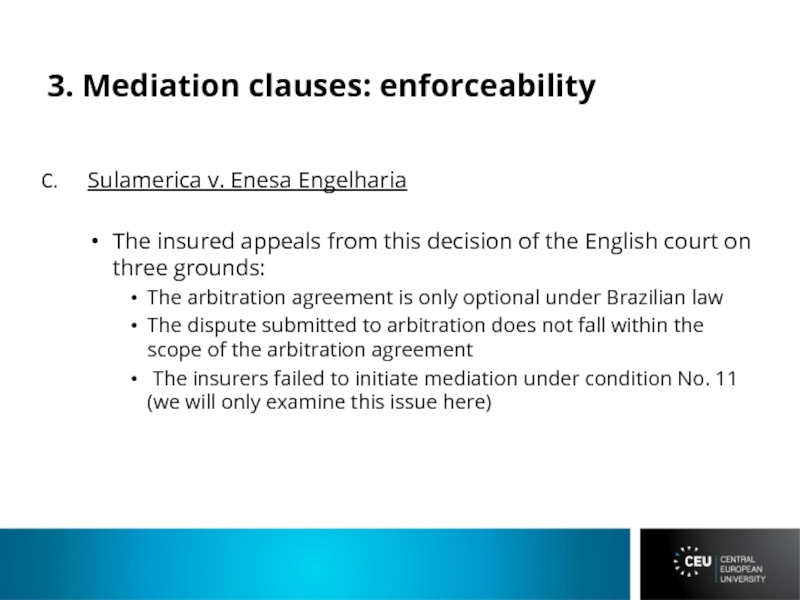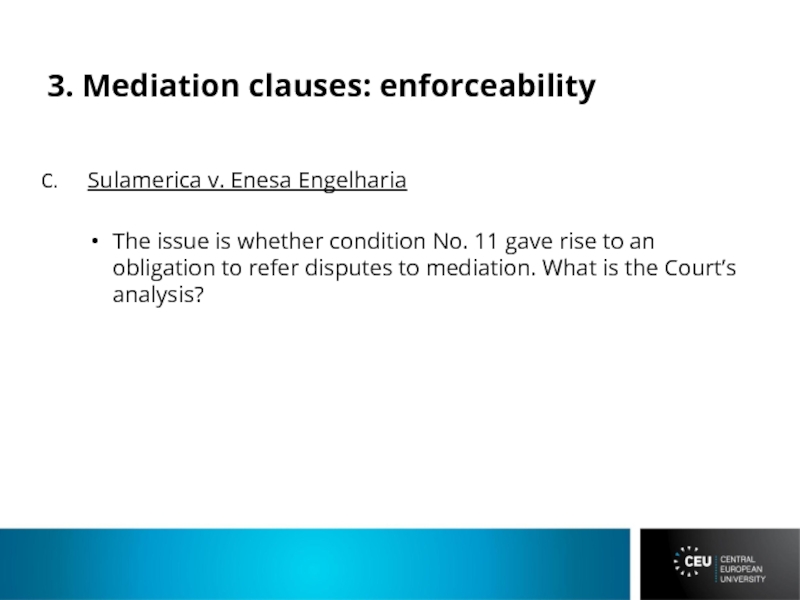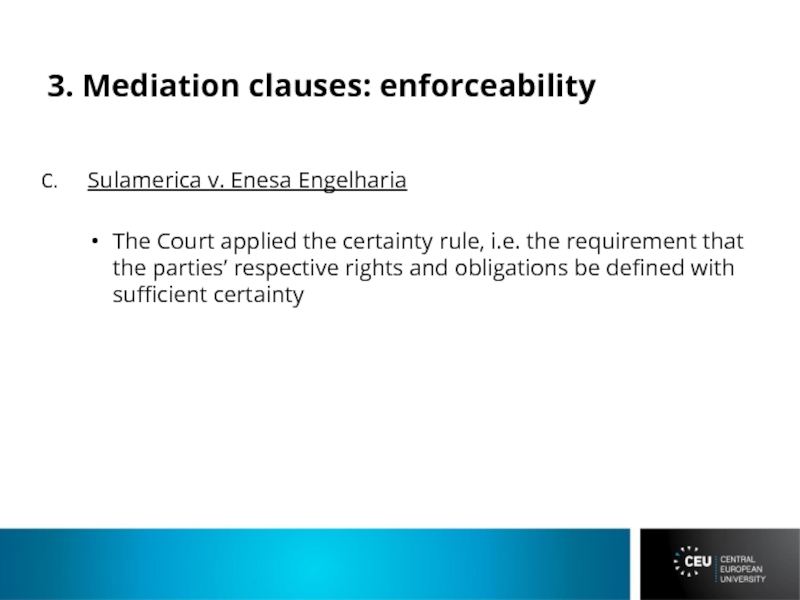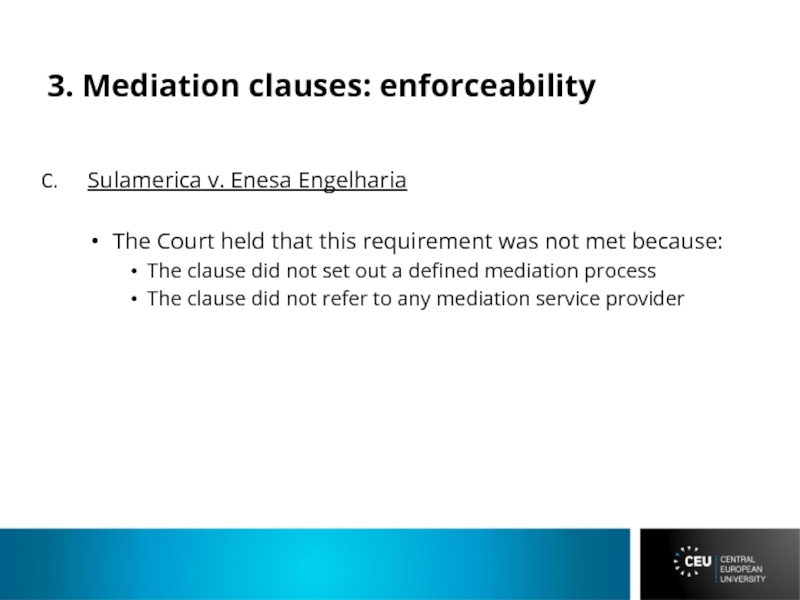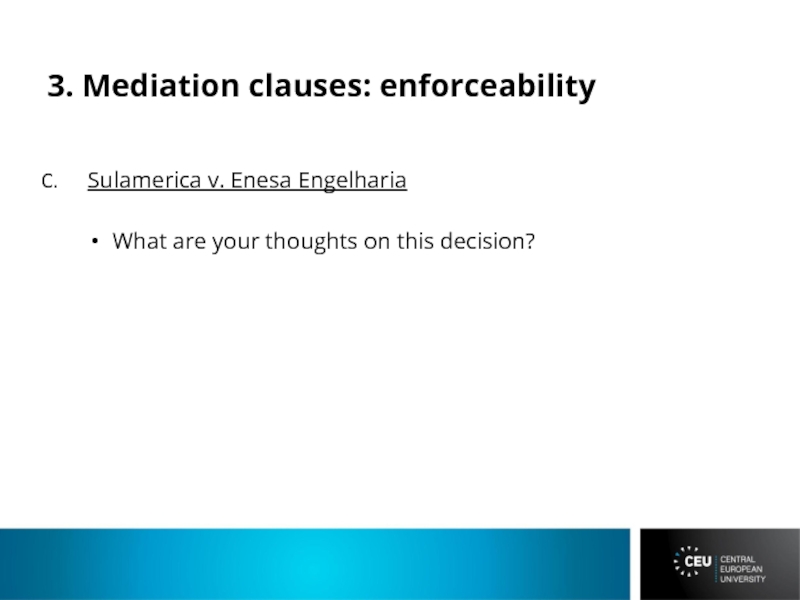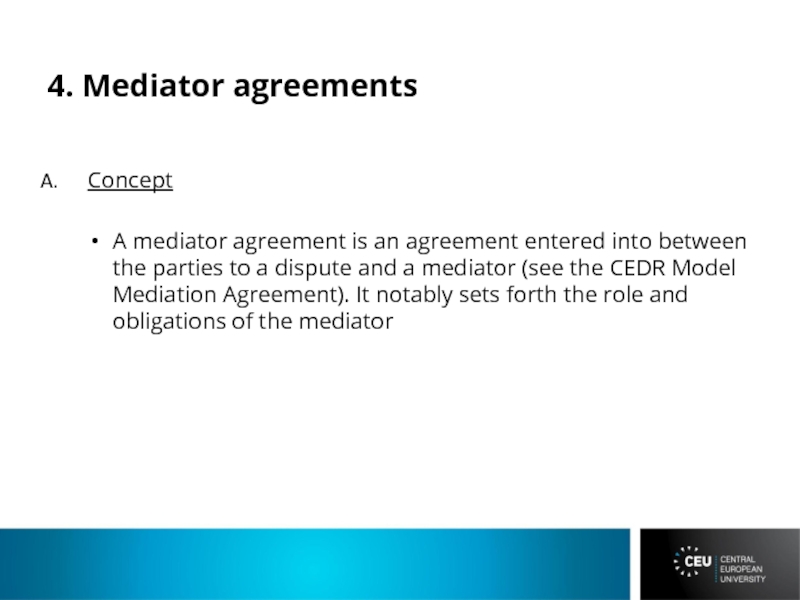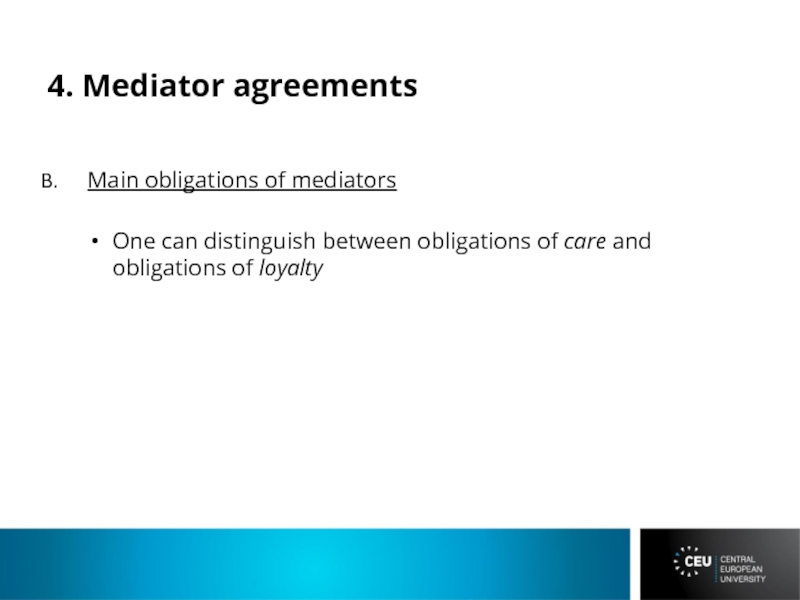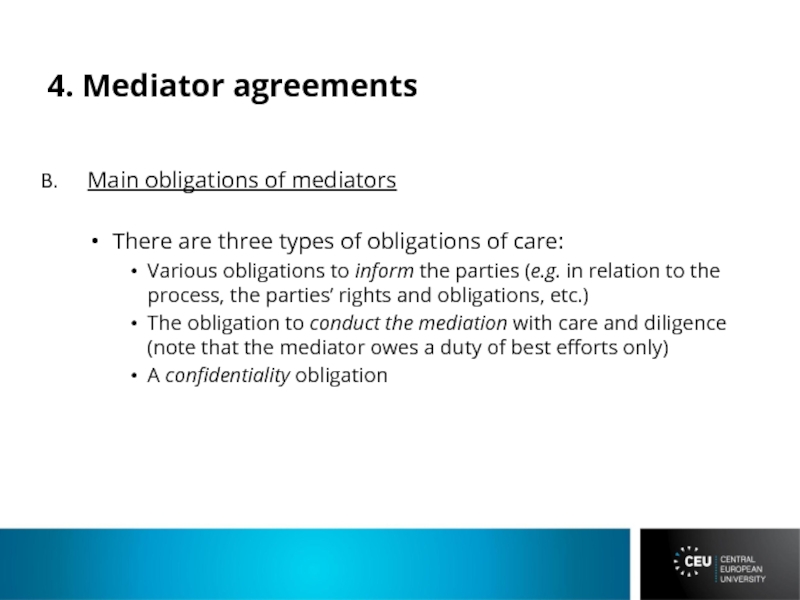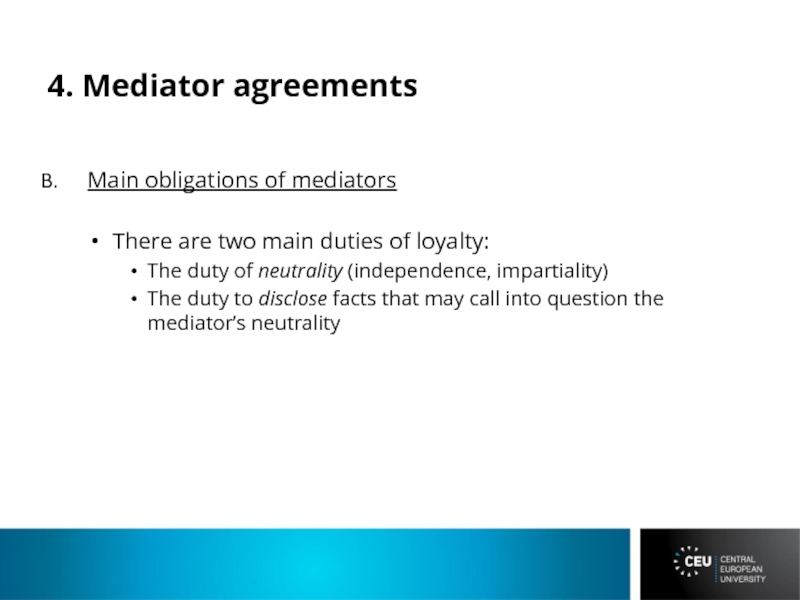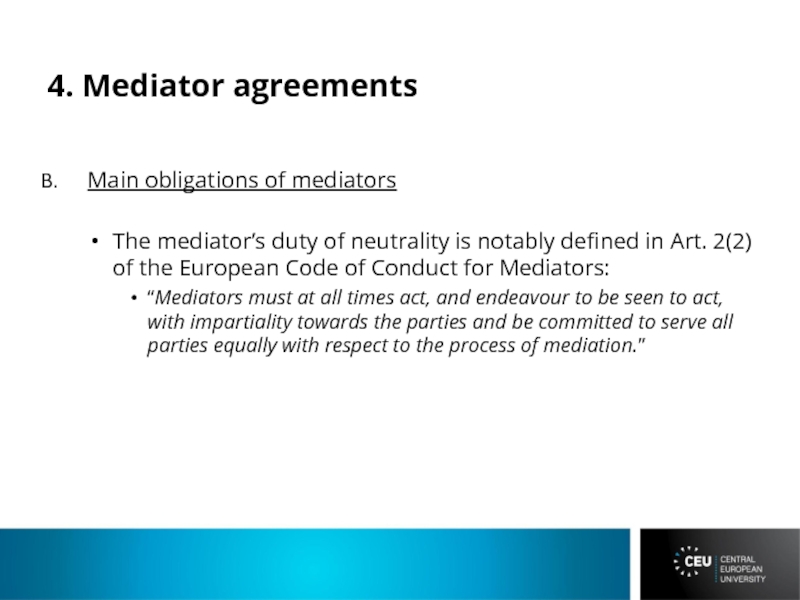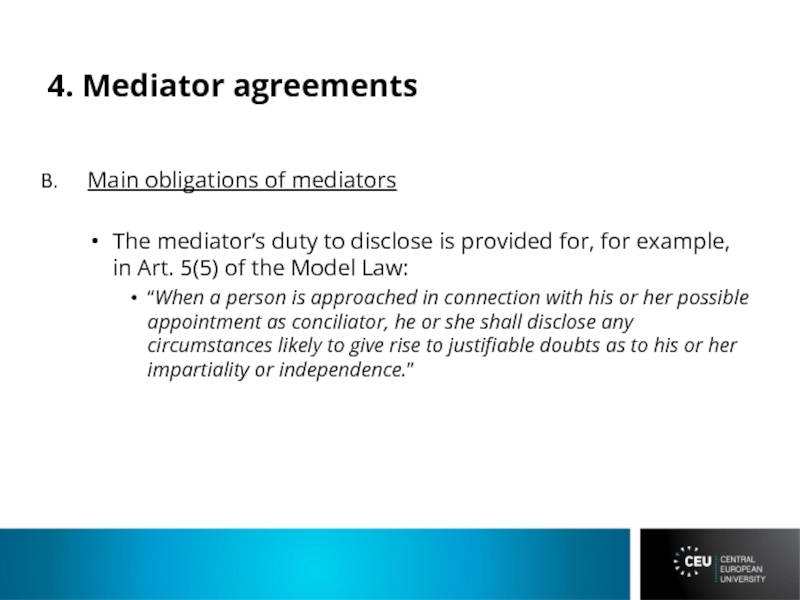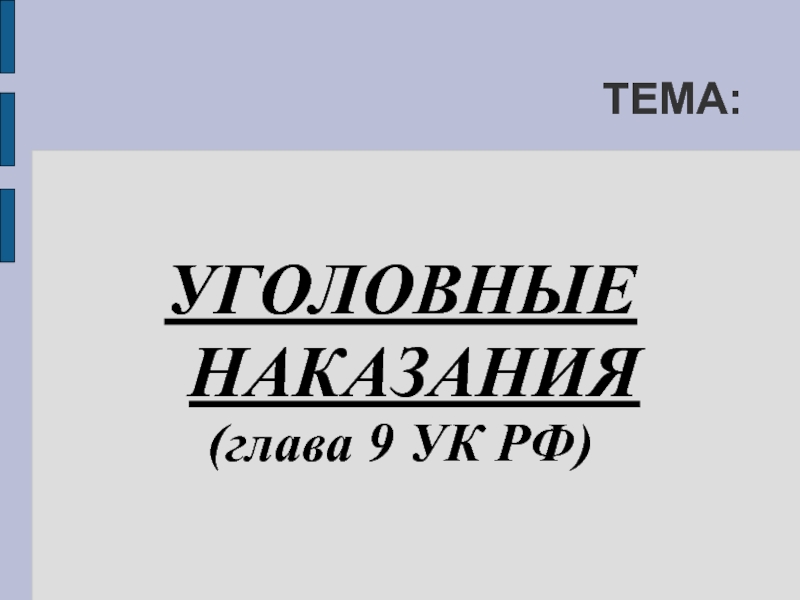- Главная
- Разное
- Дизайн
- Бизнес и предпринимательство
- Аналитика
- Образование
- Развлечения
- Красота и здоровье
- Финансы
- Государство
- Путешествия
- Спорт
- Недвижимость
- Армия
- Графика
- Культурология
- Еда и кулинария
- Лингвистика
- Английский язык
- Астрономия
- Алгебра
- Биология
- География
- Детские презентации
- Информатика
- История
- Литература
- Маркетинг
- Математика
- Медицина
- Менеджмент
- Музыка
- МХК
- Немецкий язык
- ОБЖ
- Обществознание
- Окружающий мир
- Педагогика
- Русский язык
- Технология
- Физика
- Философия
- Химия
- Шаблоны, картинки для презентаций
- Экология
- Экономика
- Юриспруденция
Mediation. Session 2. Mediation and Mediator Agreement презентация
Содержание
- 1. Mediation. Session 2. Mediation and Mediator Agreement
- 2. Contents Mediation agreements: an overview Mediation clauses: types Mediation clauses: enforceability Mediator agreements
- 3. 1. Mediation agreements Overview One
- 4. 1. Mediation agreements Ad hoc mediation
- 5. 1. Mediation agreements Mediation clause
- 6. 2. Mediation clauses: types Overview
- 7. 2. Mediation clauses: types Nature of
- 8. 2. Mediation clauses: types Nature of
- 9. 2. Mediation clauses: types Effect on
- 10. 3. Mediation clauses: enforceability Concept
- 11. 3. Mediation clauses: enforceability Concept
- 12. 3. Mediation clauses: enforceability Concept
- 13. 3. Mediation clauses: enforceability Problem
- 14. 3. Mediation clauses: enforceability Problem
- 15. 3. Mediation clauses: enforceability Problem
- 16. 3. Mediation clauses: enforceability Problem
- 17. 3. Mediation clauses: enforceability Sulamerica v.
- 18. 3. Mediation clauses: enforceability Sulamerica v.
- 19. 3. Mediation clauses: enforceability Sulamerica v.
- 20. 3. Mediation clauses: enforceability Sulamerica v.
- 21. 3. Mediation clauses: enforceability Sulamerica v.
- 22. 3. Mediation clauses: enforceability Sulamerica v.
- 23. 3. Mediation clauses: enforceability Sulamerica v.
- 24. 3. Mediation clauses: enforceability Sulamerica v.
- 25. 3. Mediation clauses: enforceability Sulamerica v.
- 26. 3. Mediation clauses: enforceability Sulamerica v.
- 27. 4. Mediator agreements Concept A
- 28. 4. Mediator agreements Main obligations of
- 29. 4. Mediator agreements Main obligations of
- 30. 4. Mediator agreements Main obligations of
- 31. 4. Mediator agreements Main obligations of
- 32. 4. Mediator agreements Main obligations of
Слайд 2Contents
Mediation agreements: an overview
Mediation clauses: types
Mediation clauses: enforceability
Mediator agreements
Слайд 31. Mediation agreements
Overview
One can distinguish two types of mediation agreements:
Ad hoc
mediation agreements and
Mediation clauses
Mediation clauses
Слайд 41. Mediation agreements
Ad hoc mediation agreements
When parties agree to mediate an
existing dispute, one speaks of an ad hoc mediation agreement
Слайд 51. Mediation agreements
Mediation clause
The parties to a contract may agree to
mediate disputes that may arise in connection with their contract (i.e. future disputes) by including a mediation clause into their contract
Слайд 62. Mediation clauses: types
Overview
Two distinctions can be drawn:
According to the nature
of the obligation undertaken
According to the effect on arbitral/court proceedings
According to the effect on arbitral/court proceedings
Слайд 72. Mediation clauses: types
Nature of obligation
One can distinguish between three types
of mediation clauses (see the ICC model mediation clauses):
Optional mediation
Obligation to consider mediation
Mandatory mediation (in the following, we will focus on this type of clause)
Optional mediation
Obligation to consider mediation
Mandatory mediation (in the following, we will focus on this type of clause)
Слайд 82. Mediation clauses: types
Nature of obligation
What kind of obligations are created
by these three types of clauses, if any?
Слайд 92. Mediation clauses: types
Effect on arbitration/litigation
One can distinguish between:
Pre-arbitral/pre-litigation mediation (court/arbitral
proceedings are excluded during mediation)
Mediation with the possibility to initiate parallel court/arbitral proceedings
Mediation with the possibility to initiate parallel court/arbitral proceedings
Слайд 103. Mediation clauses: enforceability
Concept
What does it mean to “enforce” a mediation
clause? In what circumstances may a court or tribunal hear such enforcement requests?
Слайд 113. Mediation clauses: enforceability
Concept
There are two types of obligations that may
be enforced:
The obligation to mediate
The obligation not to initiate court or arbitral proceedings (pre-trial or pre-arbitral mediation)
The obligation to mediate
The obligation not to initiate court or arbitral proceedings (pre-trial or pre-arbitral mediation)
Слайд 123. Mediation clauses: enforceability
Concept
Example: A and B have agreed to resolve
any disputes arising in connection with their contract by mediation. They have further agreed that each party may initiate arbitration proceedings after expiry of a two-month time period from the initiation of the mediation proceedings (by way of a request to mediate made by any of the parties). A dispute arises between A and B and A initiates arbitration proceedings. Is this claim admissible? The answer will depend on whether or not the mediation clause is enforceable…
Слайд 133. Mediation clauses: enforceability
Problem
The enforcement of mediation clauses is a controversial
issue. A number of courts (in various countries) have refused to enforce such clauses, both for policy and legal reasons
Слайд 143. Mediation clauses: enforceability
Problem
The primary policy reason against enforcing mediation clauses
is the perceived unreasonableness of forcing parties to seek to settle their dispute through mediation when one party has already initiated court or arbitration proceedings (that party is presumably no longer willing to mediate)
Слайд 153. Mediation clauses: enforceability
Problem
What is your assessment of this policy reason?
Is it compelling?
Слайд 163. Mediation clauses: enforceability
Problem
The main legal basis for holding mediation clauses
unenforceable consists of the possible failure of such clauses to meet the contract law requirement of “certainty” (see the decision of the English Court of Appeal in the Sulamerica case)
Слайд 173. Mediation clauses: enforceability
Sulamerica v. Enesa Engelharia
This case arises from an
insurance contract entered into in connection with the construction of a hydroelectric power plant in Brazil (the insurers are Sulamerica and others; the insured it Enesa)
Слайд 183. Mediation clauses: enforceability
Sulamerica v. Enesa Engelharia
The general conditions of contract
contain three relevant provisions:
Exclusive jurisdiction of the courts of Brazil (condition No. 7)
Mediation (condition No. 11)
Arbitration under the rules of ARIAS in London (condition No. 12)
Exclusive jurisdiction of the courts of Brazil (condition No. 7)
Mediation (condition No. 11)
Arbitration under the rules of ARIAS in London (condition No. 12)
Слайд 193. Mediation clauses: enforceability
Sulamerica v. Enesa Engelharia
Note that there is a
contradiction between conditions No. 7 and 12
Слайд 203. Mediation clauses: enforceability
Sulamerica v. Enesa Engelharia
The mediation clause provides for
mandatory pre-arbitral mediation and arbitration proceedings may be initiated if:
90 days have passed since the serving of the notice of mediation
One party fails or refuses to participate in the mediation
One party terminates the mediation proceedings by written notice
90 days have passed since the serving of the notice of mediation
One party fails or refuses to participate in the mediation
One party terminates the mediation proceedings by written notice
Слайд 213. Mediation clauses: enforceability
Sulamerica v. Enesa Engelharia
When a dispute arose between
the parties,
The insurers (Sulamerica and others) initiated arbitration proceedings in London seeking a declaration of non-liability
The insured (Enesa) sought and obtained an injunction from a Brazilian court enjoining arbitration
The insurers sought and obtained and injunction from an English court restraining the insured from pursuing the proceedings initiated in Brazil
The insurers (Sulamerica and others) initiated arbitration proceedings in London seeking a declaration of non-liability
The insured (Enesa) sought and obtained an injunction from a Brazilian court enjoining arbitration
The insurers sought and obtained and injunction from an English court restraining the insured from pursuing the proceedings initiated in Brazil
Слайд 223. Mediation clauses: enforceability
Sulamerica v. Enesa Engelharia
The insured appeals from this
decision of the English court on three grounds:
The arbitration agreement is only optional under Brazilian law
The dispute submitted to arbitration does not fall within the scope of the arbitration agreement
The insurers failed to initiate mediation under condition No. 11 (we will only examine this issue here)
The arbitration agreement is only optional under Brazilian law
The dispute submitted to arbitration does not fall within the scope of the arbitration agreement
The insurers failed to initiate mediation under condition No. 11 (we will only examine this issue here)
Слайд 233. Mediation clauses: enforceability
Sulamerica v. Enesa Engelharia
The issue is whether condition
No. 11 gave rise to an obligation to refer disputes to mediation. What is the Court’s analysis?
Слайд 243. Mediation clauses: enforceability
Sulamerica v. Enesa Engelharia
The Court applied the certainty
rule, i.e. the requirement that the parties’ respective rights and obligations be defined with sufficient certainty
Слайд 253. Mediation clauses: enforceability
Sulamerica v. Enesa Engelharia
The Court held that this
requirement was not met because:
The clause did not set out a defined mediation process
The clause did not refer to any mediation service provider
The clause did not set out a defined mediation process
The clause did not refer to any mediation service provider
Слайд 263. Mediation clauses: enforceability
Sulamerica v. Enesa Engelharia
What are your thoughts on
this decision?
Слайд 274. Mediator agreements
Concept
A mediator agreement is an agreement entered into between
the parties to a dispute and a mediator (see the CEDR Model Mediation Agreement). It notably sets forth the role and obligations of the mediator
Слайд 284. Mediator agreements
Main obligations of mediators
One can distinguish between obligations of
care and obligations of loyalty
Слайд 294. Mediator agreements
Main obligations of mediators
There are three types of obligations
of care:
Various obligations to inform the parties (e.g. in relation to the process, the parties’ rights and obligations, etc.)
The obligation to conduct the mediation with care and diligence (note that the mediator owes a duty of best efforts only)
A confidentiality obligation
Various obligations to inform the parties (e.g. in relation to the process, the parties’ rights and obligations, etc.)
The obligation to conduct the mediation with care and diligence (note that the mediator owes a duty of best efforts only)
A confidentiality obligation
Слайд 304. Mediator agreements
Main obligations of mediators
There are two main duties of
loyalty:
The duty of neutrality (independence, impartiality)
The duty to disclose facts that may call into question the mediator’s neutrality
The duty of neutrality (independence, impartiality)
The duty to disclose facts that may call into question the mediator’s neutrality
Слайд 314. Mediator agreements
Main obligations of mediators
The mediator’s duty of neutrality is
notably defined in Art. 2(2) of the European Code of Conduct for Mediators:
“Mediators must at all times act, and endeavour to be seen to act, with impartiality towards the parties and be committed to serve all parties equally with respect to the process of mediation.”
“Mediators must at all times act, and endeavour to be seen to act, with impartiality towards the parties and be committed to serve all parties equally with respect to the process of mediation.”
Слайд 324. Mediator agreements
Main obligations of mediators
The mediator’s duty to disclose is
provided for, for example, in Art. 5(5) of the Model Law:
“When a person is approached in connection with his or her possible appointment as conciliator, he or she shall disclose any circumstances likely to give rise to justifiable doubts as to his or her impartiality or independence.”
“When a person is approached in connection with his or her possible appointment as conciliator, he or she shall disclose any circumstances likely to give rise to justifiable doubts as to his or her impartiality or independence.”
